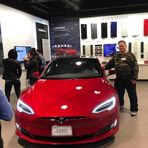Tesla's Decline: A Shift in the Electric Vehicle Landscape
January 3, 2025, 3:31 pm

Location: United States, Texas, Austin
Employees: 10001+
Founded date: 2003
Total raised: $3.86B

Location: United States, Kansas, Winfield
Employees: 1001-5000
Founded date: 2011
Total raised: $820K
Tesla, once the shining star of the electric vehicle (EV) market, is facing its first annual decline in deliveries. The company, led by the enigmatic Elon Musk, has seen its sales slip as the competition heats up and consumer preferences shift. The year 2024 marked a turning point, with Tesla delivering 1.79 million vehicles, a slight dip from the previous year. This decline raises questions about the future of the company and the broader EV market.
Incentives, once a powerful tool for driving sales, have lost their magic. Tesla's year-end promotions, including interest-free financing and free fast-charging, failed to entice buyers. High borrowing costs and a saturated market have left consumers hesitant. The allure of Tesla's aging lineup is fading, overshadowed by newer, cheaper alternatives from competitors like BYD and Volkswagen.
The Cybertruck, touted as a game-changer, has not yet delivered on its promise. Despite its futuristic design, demand appears tepid. Tesla has not disclosed specific delivery numbers for the Cybertruck, leaving analysts speculating about its reception. The company handed over nearly 496,000 vehicles in the last quarter of 2024, falling short of expectations. This miss signals a potential shift in consumer sentiment.
Tesla's struggles are compounded by external factors. Reduced subsidies in Europe and a growing preference for lower-priced hybrid vehicles in the U.S. have created a challenging environment. Analysts point to a broader trend: consumers are becoming more price-sensitive. The days of premium pricing for EVs may be numbered.
Musk's ambitious plans for a self-driving taxi business could provide a lifeline. However, this vision is still years away from realization. The promise of autonomous vehicles remains just that—a promise. For now, Tesla must rely on its existing models and the success of the Cybertruck to achieve Musk's ambitious sales growth targets for 2025.
The competitive landscape is shifting rapidly. BYD reported a 12.1% increase in sales, reaching 1.76 million vehicles in 2023. This growth highlights the challenges Tesla faces as it grapples with an evolving market. The rise of affordable EV options is reshaping consumer choices, and Tesla's once-dominant position is under threat.
Musk's political connections may offer some hope. His support for President-elect Donald Trump could lead to favorable regulatory changes. However, the implications of this relationship are complex. While Musk may gain influence, ongoing investigations into Tesla's practices loom large. The scrutiny surrounding Tesla's Autopilot and Full Self-Driving technologies raises questions about the company's transparency and accountability.
The SEC's investigations into Musk's past actions, including his $44 billion Twitter takeover, add another layer of uncertainty. As Musk navigates these challenges, the potential for political interference in regulatory matters remains a concern. Will the new administration prioritize innovation over oversight? The answer could shape the future of Tesla and the entire EV industry.
Tesla's reputation is at stake. The company has faced criticism for its handling of safety concerns related to its Autopilot system. Investigations into alleged exaggerations of self-driving capabilities have cast a shadow over Musk's claims. The legal landscape is fraught with challenges, and the outcome of these probes could have lasting implications for Tesla's credibility.
As the EV market evolves, Tesla must adapt. The days of being the sole player in the electric vehicle space are gone. Legacy automakers are ramping up their efforts, and new entrants are emerging. The competition is fierce, and Tesla's ability to innovate will be tested.
The Cybertruck's performance will be crucial. If it fails to capture consumer interest, Tesla's growth ambitions may falter. The company's reliance on its existing models could become a liability in a market that demands constant innovation. The pressure is mounting, and the stakes are high.
In conclusion, Tesla's first annual decline in deliveries signals a pivotal moment for the company. The landscape is shifting, and the challenges are mounting. Musk's ambitious plans for the future may hold promise, but the road ahead is fraught with uncertainty. As competition intensifies and consumer preferences evolve, Tesla must navigate a complex web of challenges to reclaim its position as the leader in the electric vehicle market. The journey is far from over, but the path is becoming increasingly treacherous.
Incentives, once a powerful tool for driving sales, have lost their magic. Tesla's year-end promotions, including interest-free financing and free fast-charging, failed to entice buyers. High borrowing costs and a saturated market have left consumers hesitant. The allure of Tesla's aging lineup is fading, overshadowed by newer, cheaper alternatives from competitors like BYD and Volkswagen.
The Cybertruck, touted as a game-changer, has not yet delivered on its promise. Despite its futuristic design, demand appears tepid. Tesla has not disclosed specific delivery numbers for the Cybertruck, leaving analysts speculating about its reception. The company handed over nearly 496,000 vehicles in the last quarter of 2024, falling short of expectations. This miss signals a potential shift in consumer sentiment.
Tesla's struggles are compounded by external factors. Reduced subsidies in Europe and a growing preference for lower-priced hybrid vehicles in the U.S. have created a challenging environment. Analysts point to a broader trend: consumers are becoming more price-sensitive. The days of premium pricing for EVs may be numbered.
Musk's ambitious plans for a self-driving taxi business could provide a lifeline. However, this vision is still years away from realization. The promise of autonomous vehicles remains just that—a promise. For now, Tesla must rely on its existing models and the success of the Cybertruck to achieve Musk's ambitious sales growth targets for 2025.
The competitive landscape is shifting rapidly. BYD reported a 12.1% increase in sales, reaching 1.76 million vehicles in 2023. This growth highlights the challenges Tesla faces as it grapples with an evolving market. The rise of affordable EV options is reshaping consumer choices, and Tesla's once-dominant position is under threat.
Musk's political connections may offer some hope. His support for President-elect Donald Trump could lead to favorable regulatory changes. However, the implications of this relationship are complex. While Musk may gain influence, ongoing investigations into Tesla's practices loom large. The scrutiny surrounding Tesla's Autopilot and Full Self-Driving technologies raises questions about the company's transparency and accountability.
The SEC's investigations into Musk's past actions, including his $44 billion Twitter takeover, add another layer of uncertainty. As Musk navigates these challenges, the potential for political interference in regulatory matters remains a concern. Will the new administration prioritize innovation over oversight? The answer could shape the future of Tesla and the entire EV industry.
Tesla's reputation is at stake. The company has faced criticism for its handling of safety concerns related to its Autopilot system. Investigations into alleged exaggerations of self-driving capabilities have cast a shadow over Musk's claims. The legal landscape is fraught with challenges, and the outcome of these probes could have lasting implications for Tesla's credibility.
As the EV market evolves, Tesla must adapt. The days of being the sole player in the electric vehicle space are gone. Legacy automakers are ramping up their efforts, and new entrants are emerging. The competition is fierce, and Tesla's ability to innovate will be tested.
The Cybertruck's performance will be crucial. If it fails to capture consumer interest, Tesla's growth ambitions may falter. The company's reliance on its existing models could become a liability in a market that demands constant innovation. The pressure is mounting, and the stakes are high.
In conclusion, Tesla's first annual decline in deliveries signals a pivotal moment for the company. The landscape is shifting, and the challenges are mounting. Musk's ambitious plans for the future may hold promise, but the road ahead is fraught with uncertainty. As competition intensifies and consumer preferences evolve, Tesla must navigate a complex web of challenges to reclaim its position as the leader in the electric vehicle market. The journey is far from over, but the path is becoming increasingly treacherous.
